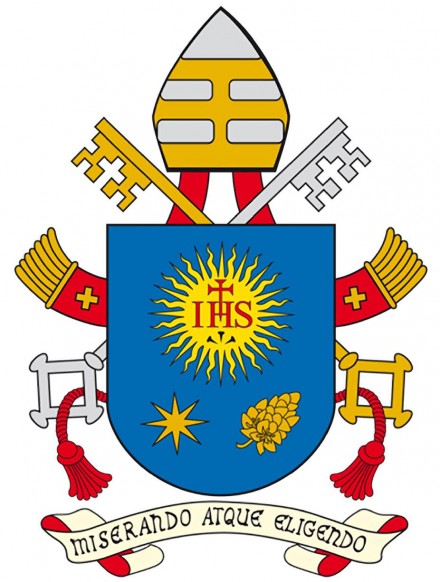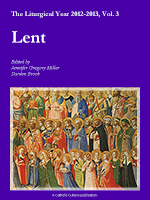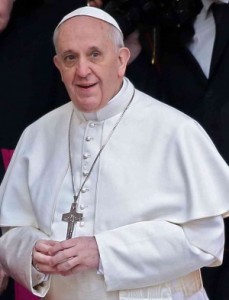
The Mass was held in the Casal del Marmo facility in Rome, where 46 young men and women currently are detained. Many of them are Gypsies or North African migrants, and the 12 selected for the foot-washing rite included Orthodox and Muslim detainees, news reports said.
Because the inmates were mostly minors – the facility houses inmates aged 14-to-21 – the Vatican and Italian Justice Ministry limited media access inside. But Vatican Radio carried the Mass live, and Francis told the detainees that Jesus washed the feet of his disciples on the eve of his crucifixion in a gesture of love and service.
"This is a symbol, it is a sign – washing your feet means I am at your service," Francis told the youngsters. "Help one another. This is what Jesus teaches us. This is what I do. And I do it with my heart. I do this with my heart because it is my duty, as a priest and bishop I must be at your service."
Later, the Vatican released a limited video of the ritual, showing Francis washing black feet, white feet, male feet, female feet and even a foot with tattoos. Kneeling on the stone floor as the 12 youngsters sat above him, the 76-year-old Francis poured water from a silver chalice over each foot, dried it with a simple cotton towel and then bent over to kiss each one.
As archbishop of Buenos Aires, the former Cardinal Jorge Mario Bergoglio would celebrate the ritual foot-washing in jails, hospitals or hospices – part of his ministry to the poorest and most marginalized of society. It's a message that he is continuing now that he is pope, saying he wants a church "for the poor."
Previous popes would carry out the foot-washing ritual on Holy Thursday in Rome's grand St. John Lateran basilica. The 12 people chosen for the ritual would always be priests to represent Christ's 12 apostles.
That Francis would include women in this re-enactment is remarkable given current liturgical rules that restrict the ritual to men.
Canon lawyer Edward Peters, who is an adviser to the Holy See's top court, noted in a blog that the Congregation for Divine Worship in 1988 said in a letter to bishops that "The washing of the feet of chosen men ... represents the service and charity of Christ who came `not to be served, but to serve.'"
Others welcomed the example he set.
"The pope's washing the feet of women is hugely significant because including women in this part of the Holy Thursday Mass has been frowned on – and even banned – in some dioceses," said the Rev. James Martin, a Jesuit priest and author of "The Jesuit Guide."
"It shows the all-embracing love of Christ, who ministered to all he met: man or woman, slave or free, Jew or Gentile," he said.
After the Mass, Francis greeted each of the inmates and gave each one an Easter egg.
"Don't lose hope," he said. "Understand? With hope you can always go on."
One of the inmates then asked him why he had come to visit them. Francis said it was to "help me to be humble, as a bishop should be." He said he wanted to come "from my heart. Things from the heart don't have an explanation," he said.
Italian Justice Minister Paola Severino, who has made easing Italy's woefully overcrowded prisons a priority, attended the Mass.
___
Follow Nicole Winfield at www.twitter.com/nwinfield




 Pope Francis will go there in the afternoon of Holy Thursday, 28 March, to celebrate the Mass of the Lord's Supper. A joyful atmosphere of expectation pervades the institute. Such an important visit had certainly not been on the cards. Above all, there had been no expectation of so suddenly touching the heart of the Pope whom they do not yet know. "The young people's enthusiasm", Liana Giambartolomei, the principal, told us, "must be linked to the very fact that they feel they will be playing the lead on a historic day. Moreover, this is exactly what Pope Francis wanted. He expressly asked us to make sure that there were no other young people here. He wants to be certain that they know he is coming solely for them, because he loves them, he carries them in his heart and considers them important, very important". A Caritas worker in the penal institute says that one of them, having heard the news, exclaimed: "At last I shall get to meet someone who says he is my father!".
Pope Francis will go there in the afternoon of Holy Thursday, 28 March, to celebrate the Mass of the Lord's Supper. A joyful atmosphere of expectation pervades the institute. Such an important visit had certainly not been on the cards. Above all, there had been no expectation of so suddenly touching the heart of the Pope whom they do not yet know. "The young people's enthusiasm", Liana Giambartolomei, the principal, told us, "must be linked to the very fact that they feel they will be playing the lead on a historic day. Moreover, this is exactly what Pope Francis wanted. He expressly asked us to make sure that there were no other young people here. He wants to be certain that they know he is coming solely for them, because he loves them, he carries them in his heart and considers them important, very important". A Caritas worker in the penal institute says that one of them, having heard the news, exclaimed: "At last I shall get to meet someone who says he is my father!".















